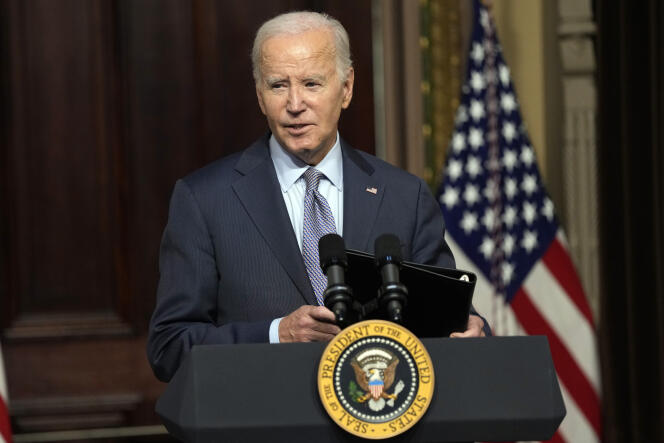


For months after Covid-19, Joe Biden boasted that he was the president who had cut the budget deficit the most. Now he's the one who's doubled it, even if an accounting trick makes it look like it's "only" increased by 23% this year. For the fiscal year ending September 30, 2023, the US Treasury has announced an official budget deficit of $1.695 billion, or 6.3% of gross domestic product (GDP), compared with $1.375 billion in 2022 (5.4%).
These figures however, which were published on Friday, October 20, do not correspond to reality due to the student debt cancellation program decided on in 2022 by Joe Biden but retracted this summer by the Supreme Court. This project initially led to an increase in the deficit of $379 billion in 2022, but the real deficit that year was actually only $996 billion. But rather than correcting the 2022 figure, the Biden administration decided to record this $379 billion as revenue for 2023, artificially reducing this year's deficit. The New York Times unpacked this sleight of hand on Friday evening, reporting "Those student loan effects changed the deficit figures for both 2022 and 2023. When factoring them out, the deficit jumped to $2 trillion in 2023 from about $1 trillion in 2022." "Excluding the accounting effects of President Joe Biden's plan," the deficit has "effectively doubled," confirmed Bloomberg.
One year ahead of the presidential election, this development had made the president's job more complicated. The rise in 10-year yields, which passed the 5% mark for the first time since July 2007, will increase the debt burden for the US Treasury. The Republicans, who are paralyzing Congress through their internal rifts, will have additional arguments for not voting for the $105 billion aid plan for US allies, including $60 billion for Ukraine. This will reignite the debate on fiscal policy, as the country recently found itself on the brink of default and a federal government shutdown.
The fiscal issue has economists worried, despite the fact that the country is currently enjoying full employment and reasonable growth in excess of 2%. "To observe this in an economy with low unemployment is truly staggering. There's never been anything like it," said Jason Furman, a Harvard professor and former Barack Obama advisor, back in September to the Washington Post.
The US deficit had tripled in 2020 to $3.1 trillion under the Covid-19 plan, and remained very high at $2.8 trillion in 2021 under Biden, before falling again in 2022. Biden attributed this decline to his administration, to the extent that it irked CNN fact-checkers. They contended that it "occurred largely because emergency Covid-19 relief spending from fiscal 2020 expired as scheduled," wrote the network in early September. It was also explained by the excellent performance of the stock market and the real estate market, which led Americans to pay more taxes in 2022.
You have 46.54% of this article left to read. The rest is for subscribers only.
